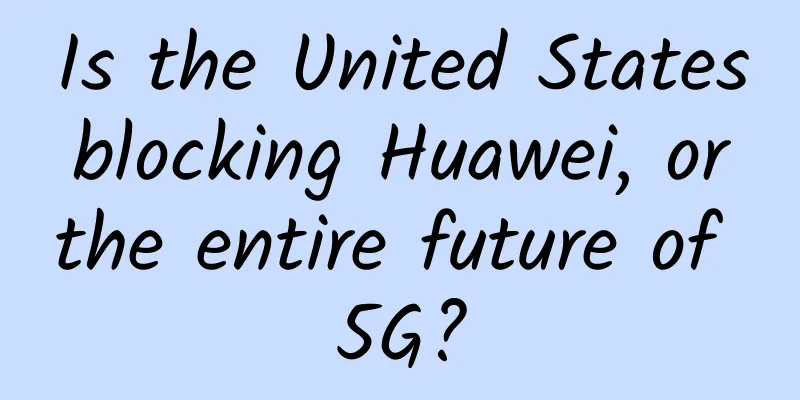Is the United States blocking Huawei, or the entire future of 5G?

|
The United States is creating obstacles for the development of Huawei's 5G business, and it is suspected that it wants to monopolize the global 5G market. (Screenshot of Financial Times report) On October 29, China Finance Network quoted the latest news from the Financial Times. According to some industry insiders who attended the US briefing, the United States will allow some manufacturers to sell chips to Huawei's non-5G business. According to reports, a semiconductor industry executive who participated in the dialogue with the US Department of Commerce said that the US Department of Commerce "has been telling companies in recent conversations that although they may be rejected when dealing with Huawei's supply license, this can be overcome if they can prove that their technology does not support 5G." The last company to obtain "supply approval for Huawei" from the United States was Samsung. Samsung Display, a subsidiary of Samsung Electronics Group, obtained a license from the US Department of Commerce to export smartphone displays (OLED) to Huawei, which did not involve chip business. Many industry insiders pointed out that from the information this time, it is not difficult to find that what the United States is really afraid of is Huawei’s capabilities in 5G. Huawei: Prepare stocks in advance to ensure that 5G equipment can be deployed It is reported that before the US restriction order came into effect (September 15), Huawei had spent several months stockpiling a large amount of critical wireless radio frequency chips to ensure that when Chinese operators invested US$170 billion (approximately RMB 1.1 trillion) to deploy 5G network construction, Huawei's 5G equipment supply could keep up with China's deployment. But relying solely on reserves is not a long-term solution. At the 2020 Information Technology Hundred People Conference in August, Yu Chengdong also said that Huawei has made huge R&D investments in chips and has also gone through a difficult process, but unfortunately, in terms of semiconductor manufacturing, Huawei has not participated in asset-intensive fields and capital-intensive industries. It has only designed chips but not manufactured them. Yu Chengdong also emphasized: "Chinese companies have only done design in the process of globalization, which is also a lesson." The United States: Strive to take the opportunity to spread the US 5G policy overseas According to Radio and Television Technology on October 21, the US government has recently stepped up its efforts to spread US 5G policies overseas. In particular, the Federal Communications Commission (FCC) and the United States Agency for International Development (USAID) have begun to work together to influence the development of 5G technology in emerging markets overseas. According to the memorandum of understanding signed jointly by the Federal Communications Commission and the United States Agency for International Development, the two agencies will jointly coordinate efforts to keep many developing countries around the world away from so-called "untrusted 5G vendors" and encourage these countries to use "open, interoperable, reliable and secure" 5G network infrastructure. In addition, the US government officially started various actions in the United States in April this year by launching the "Clean Network" plan to reduce the United States' dependence on Chinese 5G equipment suppliers Huawei and ZTE. At the same time, the US government also put pressure on its allies to take the same actions to jointly boycott 5G technology and 5G suppliers from China. So, behind all these policies, is the purpose of the United States to restrict China's 5G development? Do they want to take away the right to speak in the 5G era? What do you think? |
>>: China Mobile builds the world's largest 5G network
Recommend
20 pictures to thoroughly understand the principles of HTTPS!
[[355627]] Preface In recent years, major compani...
After talking so much about 5G, the most critical technology is here
When it comes to antennas, everyone must be famil...
5G users will exceed 190 million this year and reach 2.8 billion by the end of 2025
According to a report from Ericsson, by the end o...
Big data changes both ends of the web hosting market
Big data has transformed both ends of the web hos...
Seven technology trends for 2018 that IT pros need to know
As 2017 draws to a close, IT industry leaders are...
Supply Chain Management Is Critical to SD-WAN
SD-WAN is not an all-encompassing solution; it is...
Is SD-WAN dead? The answer is of course no
At first glance, everyone must be shocked by thi...
Seize the critical period for large-scale application of 5G
As of the end of April, more than 1.6 million 5G ...
Say hello politely - TCP protocol three-way handshake
The Art of Communication What is the most basic a...
Three things you need to know before embarking on the journey of becoming a data scientist
【51CTO.com Quick Translation】 Currently, the indu...
Why Thread will unify IoT communication protocols in the future
Various devices connected to the Internet of Thin...
HarmonyOS Sample Network Management
[[425392]] For more information, please visit: Ho...
How to save a SaaS product that is unsustainable
[[355134]] I have briefly mentioned this topic be...
10gbiz: Hong Kong CN2 GIA line VPS monthly payment starts from $2.75, Los Angeles CN2 GIA line VPS monthly payment starts from $2.36
10gbiz has released a new discount plan, offering...



![[CyberMonday] DediPath Los Angeles VPS 50% off starting at $10/year, dedicated server starting at $45/month](/upload/images/67cac46c0d826.webp)





